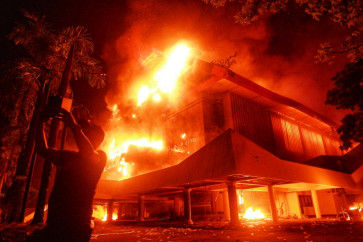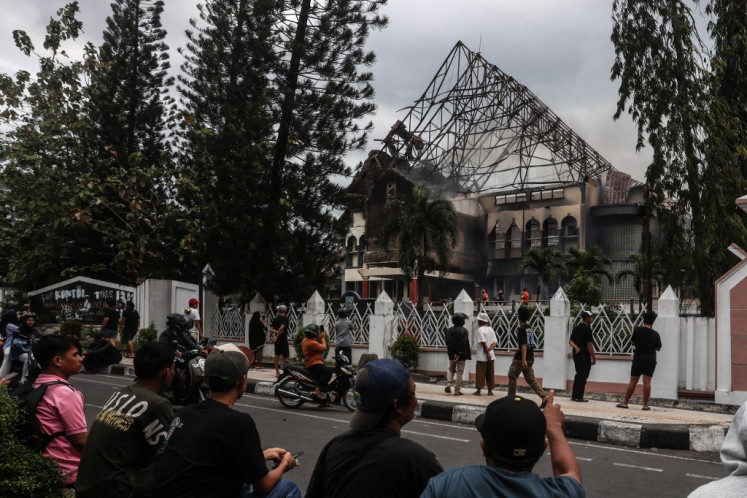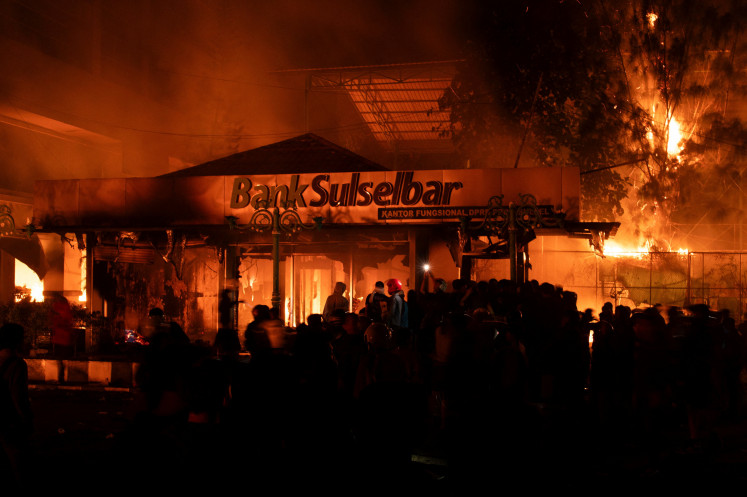Popular Reads
Top Results
Can't find what you're looking for?
View all search resultsPopular Reads
Top Results
Can't find what you're looking for?
View all search resultsRussian experts join investigation of Sukhoi Superjet crash
Meet the press: Russian Ambassador to Indonesia Alexander A
Change text size
Gift Premium Articles
to Anyone
M
span class="caption" style="width: 558px;">Meet the press: Russian Ambassador to Indonesia Alexander A. Ivanov (left) briefs journalists about the Russian Sukhoi Superjet 100 plane crash during a press conference at Halim Perdanakusuma Airport in Jakarta on Friday,while the president of the United Aircraft Cooperation, Mikhail A. Pogosyan, (second left) and Russia’s Deputy Minister of Industries and Trade Yuri Siyusar (right) look on.JP/P. J. Leo
Russian Ambassador to Indonesia, Alexander A. Ivanov, said a Russian team had arrived in Jakarta on Thursday to investigate an accident involving a Russian-made Sukhoi Superjet 100.
Speaking at a press conference at Halim Perdanakusuma Airport in East Jakarta on Friday, he said the team had met with officials from Indonesia’s National Search and Rescue Agency (Basarnas) and National Transportation Safety Committee (KNKT).
He said another 78 Russian experts in two groups would arrive to aid the investigation and evacuation of the bodies.
Ivanov said that the plane’s black box would be analyzed in Indonesia.
Ivanov and Transportation Minister EE Mangindaan, who also attended the media conference, conveyed their condolences to relatives of the crash victims.
Mangindaan said that Indonesia would lead the investigation team with the Russians as members. “The Russians will let us examine the black box because they want it to be transparent,” he said.
Ivanov also said that the nation was “deeply saddened” by the crash of a Russian-made Sukhoi Superjet 100 at Mt. Salak in West Java.
He revealed that Russian President Vladimir Putin called President Susilo Bambang Yudhoyono on Thursday evening to express his condolences.
“We want to express our deepest condolences to all of our brothers and sisters in Indonesia that have been saddened by the accident.”
The envoy added that Russia believed that the accident should not affect bilateral relations, saying that Russia “hopes trade relations with Indonesia will continue after the plane crash”.
“The cooperation that has been done by the two countries must continue,” he said.
In Medan, Coordinating Economic Minister Hatta Rajasa said the crash had yet to affect economic cooperation between both countries.
“Everything is still going as usual; economic cooperation between both countries keep going — no problem,” he said on the sidelines of an award ceremony for regional leaders.
He said there should not be any speculation on the causes of the crash and how it was related to economic cooperation, adding that the KNKT should be given time to conduct its investigation.
The regional jet with 45 people onboard disappeared from radar screens at 2:33 p.m. on Wednesday before debris was found at about 9:15 a.m. on Thursday at about 5,800 feet on the slopes of Mt. Salak in West Java.
Rescue workers reached the crash site on Friday at 10 a.m. and found 12 bodies, Basarnas chief Vice Marshal Daryatmo said in the morning.
Also attending the press conference in Jakarta was Mikhail Pogosyan, general director of Russian United Aircraft Corporation (UAC), a holding company established in 2006, which includes Sukhoi.
Pogosyan said captain pilot Aleksandr Yablontsev was one of Russia’s best pilots, despite media reports saying that pilot error was likely involved in the crash, as reported by RIA Novosti news agency on Friday.
“I know the pilot who flew this Sukhoi Superjet 100 so well,” he said. “As an aviator, Alexander Yablontsev was one of the best in the country. He started from zero until he earned a [flight] certificate from the Russian authorities. He has always been one of the best.”
Yablontsev, Sukhoi civil chief test pilot, had more than 14,000 flying hours in 221 different types of aircraft.
RIA Novosti quoted Izvestia daily’s reports that trials held at a pilot training center in Zhukovsky near Moscow had simulated “various emergency situations” and concluded that none of those could have been behind the crash.
A source at the center who declined to be named said that analysts concluded that the plane’s cockpit Terrain Awareness and Warning System (TAWS) would have informed the Sukhoi pilots’ if the plane was approaching an obstacle.
“You just cannot miss the alert signal: If there is danger, the system puts an alert message onto the central display along with a red light indicator as well as speech alert,” the source said, Izvestia reported.
However, other flight safety experts dismissed the Russian analysts, saying that their tests had not given “a complete picture.”
“Tests in a simulator do not tell the whole story,” an unnamed expert from the Russian State Scientific Research Center for Civil Aviation told Prime News agency.
Mt. Salak was reportedly covered in an active cumulonimbus cloud formation when the ill-fated Sukhoi Superjet 100 disappeared from radar screens on Wednesday, National Space and Aviation Agency (LAPAN) spokeswoman Elly Kuntjahyowati said on Friday in a media release.
Based on surveillance from a MTSAT satellite, the entire volcano was covered by a cloud that probably produced heavy rain, Elly quoted LAPAN’s Atmospheric Science and Technology Center. (nfo/sat)










